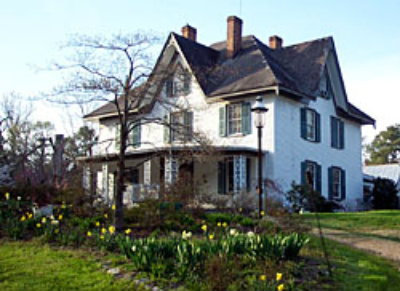
Courtesy of Rustin Quaide, National Register of Historic Places
Edgewood is an historic plantation located on a tract of land that was once part of Berkeley Hundred. The plantation consists of a complex of early 1700 and 1800s buildings. It is likely that Benjamin Harrison V built a mill on what would be Edgewood plantation in the 1700s. The mill stayed in the Harrison family until Harrison VII experienced financial problems in the 1840s. In 1847 the mill was sold to pay outstanding debts. Edward Wilcox of Charles City County purchased the property, but eventually sold it to Richard S. and William C. Rowland.
The Rowland brothers were millers from New Jersey. They built the Edgewood mansion in 1854 in the Gothic Revival architectural style. The home has a traditional center hall which provided the setting for a three-story staircase. A dramatic increase in tax assessments demonstrates that the home and modifications to the mill were completed by 1856. By this time only ten other property owners paid more in taxes than the Rowland brothers. This brought the Rowland family new wealth and leadership in the county. Richard took over the vestry of Westover Parish. When the Westover Church was destroyed by Federal troops, Sunday worship services were moved to the Rowland house. This continued until after the Revolutionary War ended and the church could be repaired and reopened.
Edgewood was occupied during the Revolutionary War and Civil War. During the Revolutionary War, for example, Benedict Arnold and his troops established a camp at Edgewood due to its strategic importance. During the Civil War the third floor of Edgewood was used as a lookout post for Confederate generals. The mill ground corn for both the Union and Confederate armies. On the final leg of General J.E.B. Stuart's celebrated ride around the rear of the Union Army in June 1862, he stopped at Edgewood for a cup of coffee. Two weeks later, General George McClellan established a defensive line along the southern edge of Herring and Kimmage Creeks. Right in the middle of this position, the Rowland house witnessed McClellan's demoralized army. After the army was evacuated in August 1862, Mrs. Rowland is said to have constructed a wooden fence with discarded tent poles left by the soldiers.
In the early 1900s, Edgewood became the county's first restaurant, The Blue Tea Pot. The house has also served as a church, post office, telephone exchange, and is now a bed and breakfast. Edgewood was listed on the National Register of Historic Places on February 18, 1983. The house is open daily for tours. For more information and for reservations, please call (804) 829-2962 or visit: EdgewoodPlantation.com.
Last updated: September 14, 2016
